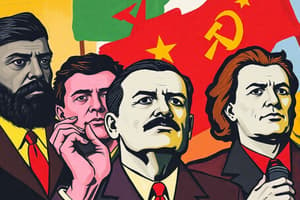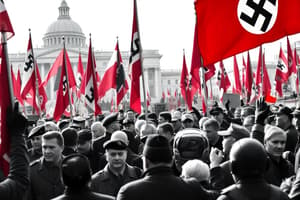Podcast
Questions and Answers
फासीवाद शब्द की उत्पत्ति किस भाषा के शब्द से हुई है?
फासीवाद शब्द की उत्पत्ति किस भाषा के शब्द से हुई है?
इतालियन भाषा के 'Fascio' शब्द से
इटली के फासी दल ने किस चिह्न का प्रयोग किया?
इटली के फासी दल ने किस चिह्न का प्रयोग किया?
लकड़ियों का बंधा हुआ बोझ व कुल्हाड़ी
फासीवाद का स्वरूप सैद्धान्तिक कम और व्यावहारिक अधिक क्यों है?
फासीवाद का स्वरूप सैद्धान्तिक कम और व्यावहारिक अधिक क्यों है?
मुसोलिनी ने युवाकों को एकता की प्रेरणा देने वाला मुसोलिनी का कार्य को अधिक महत्व दिया था तथा वास्तविक उद्देश्य की प्राप्ति करना चाहते हैं।
फासीवाद में निश्चित सिद्धान्तों का अभाव है।
फासीवाद में निश्चित सिद्धान्तों का अभाव है।
फासीवाद एक अवसरवादी विचारधारा है।
फासीवाद एक अवसरवादी विचारधारा है।
किसने कहा कि "हमारा कार्यक्रम कार्य करना है, केवल बातें करना नहीं"?
किसने कहा कि "हमारा कार्यक्रम कार्य करना है, केवल बातें करना नहीं"?
किसने कहा कि फासीवाद में निश्चित सिद्धान्तों, विचारधारा या दर्शन का अभाव है?
किसने कहा कि फासीवाद में निश्चित सिद्धान्तों, विचारधारा या दर्शन का अभाव है?
फासीवाद का मूल आधार क्या है?
फासीवाद का मूल आधार क्या है?
Flashcards
Fascism Meaning
Fascism Meaning
English translation of Fascism, derived from the Italian word 'Fascio,' meaning a bundle of rods and an ax.
Fascism Focus
Fascism Focus
Fascism prioritizes national unity and state control over a class-based society.
Mussolini's Fascism
Mussolini's Fascism
Mussolini emphasized action over discussion, focusing on practical goals.
Flexible Ideology
Flexible Ideology
Signup and view all the flashcards
Fascism Core
Fascism Core
Signup and view all the flashcards
Fascism (Jawaharlal Nehru)
Fascism (Jawaharlal Nehru)
Signup and view all the flashcards
Fascism (Mussolini)
Fascism (Mussolini)
Signup and view all the flashcards
Fascism (Sabine)
Fascism (Sabine)
Signup and view all the flashcards
Study Notes
Fascism
- Fascism opposes socialism, communism, and liberalism, lacking a definite ideology or philosophy.
- Fascism can be defined through its opposition to other ideologies.
Meaning of Fascism
- "Fascism" is derived from the Italian word "Fascio," meaning a bundle of rods and an axe.
- In ancient Rome, the "Fascio" symbolized national unity and authority.
- Mussolini's Fascist Party in Italy adopted this symbol to represent the party's goal.
- The Fascist Party aimed to replace class conflict-based socialist systems with a system emphasizing state control and national unity.
Key Aspects of Fascism
- Mussolini emphasized action over debate.
- He aimed to unite the youth by instilling a collective spirit.
- The focus was on practical goals and tangible achievements.
- The political strategy appeared adaptable but often lacked core principles.
- Fascism embraced a mix of traditional and revolutionary ideas, appealing to diverse groups.
- It opposed established political norms, supporting both aristocratic and proletarian elements, and embraced both pacifism and its opposition.
- The only fixed idea was the importance of the state.
- Italian politician Gentile noted fascism's flexibility, adapting to contemporary needs.
- Sabine observed that fascism combines different ideas, adjusting based on the situation.
- Fascism is an opportunistic ideology based on totalitarianism.
- Fascism lacks fixed principles or a guiding philosophy, defined mainly by opposition to socialism, communism, and liberalism.
- Fascism prioritizes action and rejects idle talk, focusing on definiteness and realism.
- Fascism is a collection of ideas adapted to the demands of the time.
Studying That Suits You
Use AI to generate personalized quizzes and flashcards to suit your learning preferences.




